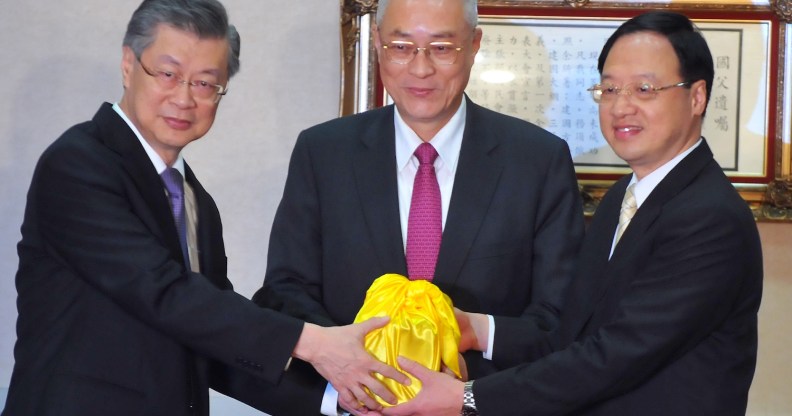Taiwan’s former Vice President slammed for telling government to halt gay marriage plans

As same-sex marriage looks set to become a reality in Taiwan, the former Vice President has been criticised for telling the government to halt plans.
The Committee in Taiwan’s Legislature passed an amendment to include same-sex marriage in the Civil Code of the country on 26 December.
The passage of the amendment was the first step in legalising same-sex marriage.
The former Vice President Wu Den-yih said when stopped by a reporter that the government should stop the plans executed only for “an extremely small minority with a different sexual orientation”.
The candidate for the Chinese Nationalist Party’s (KMT) chairperson election was criticised by Chen Fang-ming, a professor at National Chengchi University’s Graduate Institute of Taiwan Literature.
Chen wrote on Facebook saying the former VP showed he had litte understanding of democracy.
“He is basically still living in the martial law era. The core concepts of democracy and human rights are equality and justice, not separating people,” he said.
“The nation has had three changes in government, but the KMT does not seem to have changed its ideas about politics and still thinks that government is meant to serve those with vested interests,” Chen added.
“Wu wants to halt the proposed legislation on same-sex marriages; what he does not know is that people have already stopped believing in the KMT. Should the party continue to promote its own vested interests, it would never become the ruling party again,” he continued.
Article 972 will add the paragraph stating “an agreement to marry between people of the same-sex shall be made by two parties involved”.
This is in addition to “an agreement to marry shall be made by the made and the female parties themselves.”
Other amendments include the rights and duties which will be applied to same-sex couples who marry, also passed.
The legislator who introduced the bill, Yu Mei-nu, says that she is fairly confident that the bill could pass, despite the country being divided on the issue.
Opposition ha grown, with religious groups demonstrating and encouraging people to oppose it.
Yu said: “We’re almost close to passing it”.
She estimates that 54 of 113 legislators are in favour of marriage equality, despite saying “some of them are under pressure so they might flake”.
She hopes to pass the measure before 2018, when an election could “make every issue politicised”.
The country’s parliament will debate the amendments in what activist hope will mean Taiwan will be the first Asian country to legalise same-sex marriage.
Despite some opposition from Christian groups, supporters hope that if legalised in Taiwan, other Asian countries will follow.
The Democratic Progressive Party (DPP) Caucus Whip earlier in December said that the bill to legalise same-sex marriage in Taiwan “will be passed” in 2017.
The country is one of the most progressive in Asia on LGBT rights, providing some LGBT rights protections and allowing some limited recognition of same-sex relationships.
Ker Chien-ming said that he holds no “loathing for homosexuality”, and that the bill will be passed after a legislative committee on 26 December, and in the next legislative session.
He said the bill would go for a third reading in the general committee after the December hearing.
HIs own party’s legislator Yu Mei-nu has taken a leading role in pushing for equality in the country.
President Tsai Ing-wen said following protests in favour of the bill: “Let’s not treat the people around us as enemies,”
Lawmakers in the country are hoping to push further on equality issues – with politicians from the governing Democratic Progressive Party (DPP) last month filing a bill that would legalise same-sex weddings.
The bill would change the definition of marriage to specify it is between two people, rather than between a “man and woman”.
As the legislation heads towards Parliament, hopes are high that it could pass – making Taiwan the first country in Asia to permit same-sex couples to marry. The country’s President, Tsai Ing-wen of the Democratic Progressive Party, previously expressed support for equal marriage.
There is some opposition to the legislation, however, primarily from Western-inspired fundamentalist church groups, who have some influence in the region.
The anti-LGBT Alliance of Religious Groups for the Love of Families Taiwan has vowed to protest the change.
The group’s head Chang Shou-yi fumed: “What gay activists want is for their lifestyle to be affirmed by society, but why do they need to change the traditional institution of marriage, which goes back thousands of years?”

